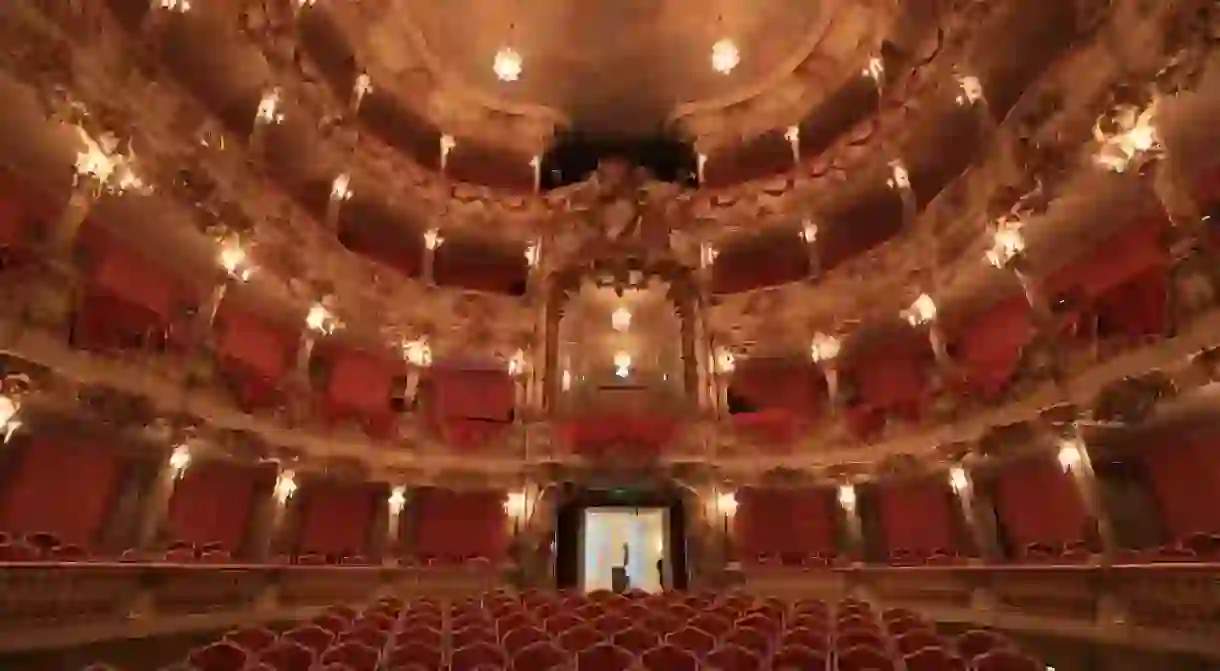The 11 Best Opera Houses in Germany

Opera houses in Germany are almost impossible to miss. Every one of the 83 opera houses in the country is owned by the state, and puts on a full season. By contrast, in the USA, the Metropolitan is the only house with a full 52-week season. Tickets at German theatres are a steal compared to American and British ones, and almost all houses have regular programs for children, so family outings are both enjoyable and affordable. If a big night out is on the agenda, here are 11 places that will deliver in spades.
Bayerisches Staatsoper, Munich
Concert Hall
Nearly destroyed by Allied bombs in 1943, the Bayerisches Staatsoper reopened in 1963 with its famous eight-columned portico ready to receive the great and the good again. For most of its life, the Staatsoper has been a major stop on the opera circuit. All the best singers sing there, and it has been home to many important premieres.
Semperoper
Building

Komisches Oper Berlin
Concert Hall
Germany has a strong tradition of operetta – lighter, funnier shows like Gilbert & Sullivan – as well as the more serious opera, and the Komisches Oper Berlin gleefully mixes the genres. Operetta is its own special art form, a sort of halfway house between opera and musicals. Most of the text is in German, but subtitles are projected so that speakers of other languages can enjoy the jokes too.
Deutsche Staatsoper Berlin
Concert Hall
The Staatsoper has functioned as the official court opera for Prussian royalty since 1741, and has, in the intervening years, had just 19 music directors, the current director being Daniel Barenboim. In addition to grand opening night galas and season premieres, the Staatsoper offers family tours, workshops and special shows designed for children. Grownups can also join one of the special backstage tours or lectures.
Oper Köln
Concert Hall
Mired in a never-ending renovation nightmare that will soon put the Elbphilharmonie and Berlin Airport projects to shame, Oper Köln has had to get creative, venue-wise. Their second temporary home, in the repurposed Staatshaus across the river in Deutz, is not ideal, but the company is going to great lengths to use the limits of the venues to create interesting and modern productions. Tickets are reasonably priced, and as with all houses in Germany, standing tickets and returns are cheaper still.
Oper Frankfurt
Concert Hall

Whether you’re in town for business or pleasure, a visit to the Oper Frankfurt will be a highlight of your visit. A painting by Marc Chagall hangs in the foyer, and many of Europe’s leading singers sing here. In addition to opera and ballet, Frankfurt Oper offers a recital series giving an increasingly rare opportunity to hear singers alone on stage with just a piano. It’s the musical equivalent of a tightrope walk over Niagara Falls.
Aalto Theater, Essen
Concert Hall
Easily the best opera house in North-Rhine Westphalia, Germany’s most populous state, the Aalto Theatre Essen is about an hour’s train ride from Cologne. With a signature indigo carpet and modern, asymmetrical design, the Aalto Theatre produces nearly 20 operas from late September to June, often in modern productions, and a strong young singers’ program means a first glimpse of the stars of tomorrow.
Bayreuth Festival Theatre
Concert Hall

The Richard Wagner Festival Theatre in Bayreuth is one of Germany’s most famous opera houses and was built by one of its most famous (or infamous) composers as a shrine to himself, or at least to his particular vision of how his work should be performed. Having rich friends is a wonderful thing, and in 1876, his theatre opened on top of Green Hill in an architectural style that combines classical Greek and medieval German styles. Tickets are enormously difficult to come by and ruinously expensive. Seats are desperately uncomfortable and performances are between three and seven hours long. Still, if there’s a ticket to be had, attending a performance here is a once-in-a-lifetime experience that should not be turned down.
Margraval Operhaus, Bayreuth
Concert Hall
Still in possession of is original wood and canvas, the sumptuous Margravial Opera House in Bayreuth is the only place left in the world where opera-goers can hear shows as they would have sounded in the 18th century. The Margrave was responsible for bringing Wagner to Bayreuth, for better or worse. The opera house is currently being renovated, but visitors can still see parts of this UNESCO World Heritage Site while work is going on.
Festspielhaus Baden-Baden
Concert Hall
Built in what was once Baden-Baden’s neo-renaissance train station, the Baden-Baden Festival Theatre, Germany’s largest, is the home of grand opera from a bygone age. The town was for hundreds of years the place where the super-rich went to take the waters, eat sinful amounts of food and roll on out to the opera. The crème de la crème of performers come here to continue the tradition in a series of holiday festivals. Despite the glamour, it is possible to get a decent ticket for €22.
Staatstheater Kassel
Concert Hall
Smack dab in the middle of Germany, the city of Kassel has had an opera theatre of some sort since the first decade of the 17th century, which is more or less when opera was invented as an art form. This now medium-to-small city has also had an orchestra for nearly 520 years. The current opera house was opened in 1959 after the old building was damaged in the war. The theatre presents around 30 shows per season, which means there’s something on nearly every day.













